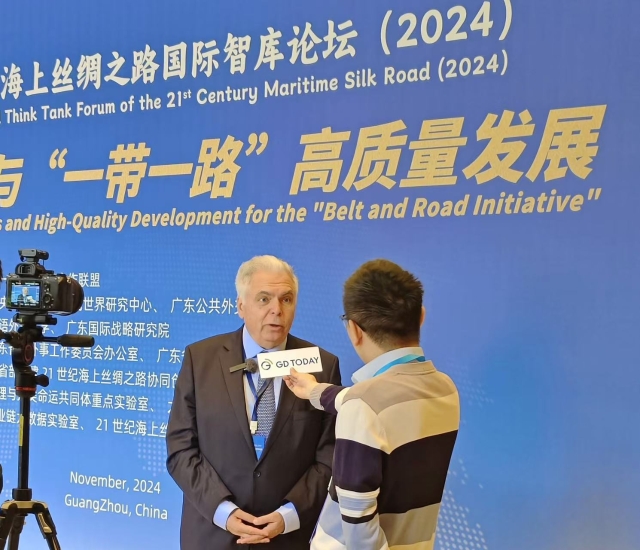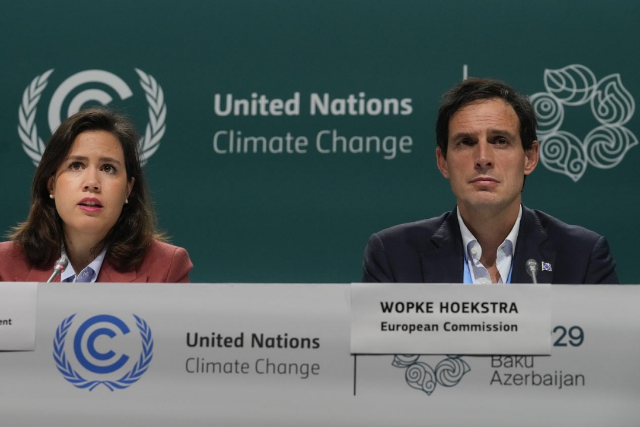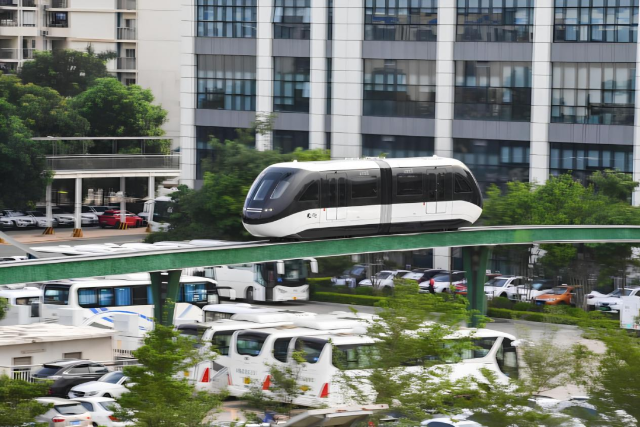Ultimately, the UN climate change conference (COP29) in Baku, which closed on November 24, reached an agreement to triple finance to developing countries, from the previous goal of US$ 100 billion per year to US$ 300 billion annually by 2035.
Two days earlier, the International Think Tank Forum of the 21st Century Maritime Silk Road (2024) was held on November 22 in Guangzhou, co-organized by the Guangdong Institute for International Studies (GIIS). After his opening remark, Adrian Severin, former Deputy Prime Minister and Foreign Minister of Romania, received an interview with GDToday.
Mr. Severin shared his insights on the double duties of advanced countries on climate change and possible areas for collaboration between China and the EU. He also denounced the EU's protectionism regarding tariffs on Chinese electric vehicles (EVs) exported to Europe.

Adrian Severin, former Deputy Prime Minister and Foreign Minister of Romania, receives the interview with GDToday. (GIIS Photo)
Developed countries have a double duty on climate change
Regarding climate change, Mr. Severin noted that policies to cope with it are costly given the complexity of the issue.
"Certainly, the developed countries are in a better position to contribute to coping with this challenge," he stated. "The problem is that the developed countries have splendid speeches and fewer facts, fewer deeds."
Mr. Severin underscored that developing countries are those who suffer more, as they cannot use traditional means to develop their economies.
He detailed that developed countries used methods that did not take the climate into consideration. Now, developed countries are asking developing countries not to use the same methods for their own development.
"Are we going to leave these developing countries in a state of misery, even greater misery than until now?" questioned Mr. Severin.
According to him, developed countries have a double duty. First, they need to contribute at the level of their capabilities to solve the problem linked to climate change. Second, they must support developing countries in this endeavor without causing them to lose their opportunity to catch up with developed economies.

Lidia Pereira, head of the European Parliament Delegation (L), and Wopke Hoekstra, EU climate commissioner (R), attend a news conference at the COP29 U.N. Climate Summit on Wednesday, Nov. 20, 2024, in Baku, Azerbaijan. (CFP Photo)
China and EU countries can work on technological progress to address challenges of climate change
Given the common goal of carbon neutrality before 2060, Mr. Severin highlighted technological development among many fields of cooperation related to climate change between China and the EU.
At the urgent demand of new, expensive technologies, as they are not very well marketable in the short run, he noted that the status quo would require deeper cooperation between members of the European Union and China.
"China is a top actor in terms of technological progress and research," Mr. Severin noted. Based on the World Energy Outlook 2024 released by the International Energy Agency in October this year, China accounted for 60% of the new renewable capacity added worldwide in 2023.
However, Mr. Severin claimed that the European Union is "too shy or too skeptical" in ameliorating cooperation with China.
"There are many ideological, stupid approaches which claim that China is a threat to European security if we link each other in the field of new technologies."
For all the concerns, Mr. Severin said that there is a lot of room for collaboration and that the two parties have to talk, negotiate, and find guarantees. "But in any case, we should not close the doors," he added.

A cloud rail train run in the campus of the headquarters of China's new-energy vehicle manufacturer BYD in Shenzhen, China's Guangdong Province on Sept. 23, 2020. (Xinhua Photo)
EU protectionism is the culprit of tariffs on Chinese EVs exported to Europe
"Basically, I'm against European Union protectionism," Mr. Severin noted when asked about tariffs on Chinese EVs exported to Europe.
According to him, European citizens pay higher prices on the internal European market due to the very protectionist approach the European Union has adopted.
"Who suffers? The European citizens."
In this vein, Mr. Severin voiced that the EU needs more investment from Chinese entrepreneurs and enterprises.
"If we protect our European entrepreneurs too much, they will not progress. Competition is a means of progress. We have allowed our European entrepreneurs to become lazy and to avoid risks," he underscored.
According to Mr. Severin, European enterprises are so well protected that they should take risks since it is not in good shape from the point of view of the customer and the world economic order.
He claimed that the EU should change many concepts, mentalities, and policies for the time being. He is not 100% optimistic that this will occur immediately, though.
However, he saw a silver lining and reminded us that European Union advances are pushed by necessity.
"The necessities are now so obvious that they will eventually determine a change in attitude and policies at the top of the European Union," added Mr. Severin.
Reporter | Zhang Ruijun
Video | Zeng Xiangxing, Liang Zijian
Editor | Yuan Zixiang, James, Shen He
















